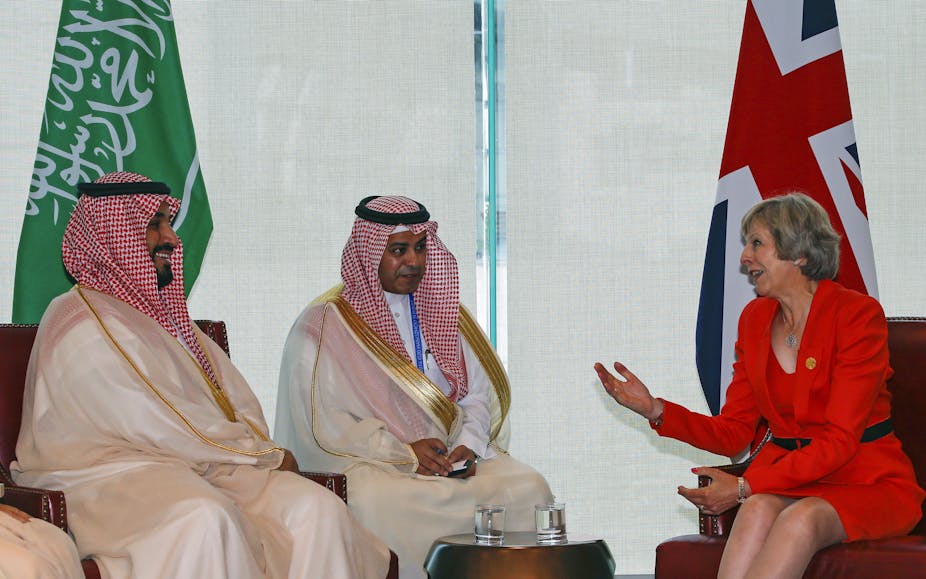The recent parliamentary bunfight over UK arms export policy towards Saudi Arabia illustrates the government’s boundless ability to mangle the meaning of simple words.
Under the 2008 EU Common Position on arms exports, the UK is committed not to grant an arms export licence “if there is a clear risk” the arms “might be used in the commission of a serious violation of international humanitarian law”. This requirement is enshrined in British law, and was amplified when Britain ratified the UN Arms Trade Treaty in 2014.
And yet the government seems unable grasp the meaning of the phrase “clear risk” – at least not as it applies to the £3.3 billion of British arms exports licensed to Saudi Arabia since the start of the Saudi-led bombing campaign in Yemen in 2015, which has now claimed thousands of lives.
An ever-growing list of respected organisations have concluded that the Saudi-led coalition has used its arms in precisely the ways that British, EU and international law proscribe. In December 2015, the UN high commissioner for human rights condemned “heavy shelling … in areas with a high concentration of civilians” and noted that “a disproportionate share appeared to be the result of air strikes” carried out in Yemen by the Saudi-led coalition, and in January 2016 a UN panel of experts documented 119 air sorties in Yemen “relating to violations of international humanitarian law”.
The NGO Human Rights Watch, meanwhile has documented incidents where cluster bombs have been used on residential neighbourhoods in various parts of Yemen.
Speaking in London in February Ban-Ki Moon, the UN secretary general, urged states such as Britain to “set an example in fulfilling one of the [arms trade] treaty’s main purposes: controlling arms flows to actors that may use them in ways that breach international humanitarian law”.
Despite all this, the British foreign secretary, Boris Johnson, claimed recently that the test of whether weapons “might be used” to commit serious breaches of international humanitarian law had “not been met”.
This claim should be treated with caution. After all, the British government also seems to have a perennial problem with the meaning of the word “not”.
Weasel words
Until July 2016, the government repeatedly stated that: “We have assessed that there has not been a breach of [international humanitarian law] by the coalition.” However, on the last day of parliament before the summer break, it sneaked out an announcement that these statements should have read “we have not assessed there has been a breach” of international humanitarian law.
Given that the government is under increasing pressure to demonstrate its commitment to the law, its retreat from confidence to something more noncommittal is subtle, but telling. And even with the government issuing something resembling a mea culpa, the basis for Johnson’s claim remains unclear.
The controversy escalated when the BBC’s Newsnight obtained a draft Commons Committees on Arms Export Controls (CAEC) report on the use of British arms in Yemen. After the programme, Newsnight editor Ian Katz tweeted that the draft’s conclusions were coming under pressure:
The draft CAEC report called for a suspension of arms exports pending an independent international investigation. British Prime Minister Theresa May has dismissed any such plan, pointing to “the strength of our relationship with Saudi Arabia” on counter-terrorism co-operation. Nevertheless, the UK and Saudi governments are clearly rattled by the controversy – why else would the Saudi foreign minister bother to appear on Channel 4 News? And the UK government now faces a judicial review of its policy.
In the end, threats to prevent a CAEC vote on the draft report, combined with the leak to Newsnight, made consensus impossible among the four Committees that comprise it (Business, Defence, Foreign Affairs, and International Development). Two rival reports were eventually published, one jointly by the Business and International Development Committees, and one by the Foreign Affairs Committee; the Defence Committee remained oddly silent.
Bad priorities
All this wrangling indicates that the CAEC has indeed made a powerful case that the British government should be held accountable for arms sales. But the apparent efforts to water down the report, thus delaying its publication, are nonetheless deeply ominous.
There’s ample precedent for this. A 1992 National Audit Office report on arms exports to the Saudis agreed under the Thatcher government has to date never been made public; in 2006, the attorney general shut down a Serious Fraud Office inquiry into allegations of bribery linked to the notorious Al-Yamamah programme of arms exports to Saudi Arabia.
The national security argument for watering down the CAEC report – which was also invoked as a reason for closing down the Serious Fraud Office’s probe in 2006 – privileges a particular interpretation of national security concerns over and above the state’s obligations on arms exports. The upcoming judicial review will be an interesting test of the legal questions this raises.
This is not merely a matter of sordid Whitehall wordplay. At stake in this controversy are civilian lives in Yemen, the protection of international humanitarian law as both principle and practice, and the British state’s domestic accountability.
As things stand, the government has ended up suggesting that Britain can be a staunch defender of international humanitarian law while providing arms to a country that is destroying civilian lives. And when confronted with the ugly implications of its actions, its response has once again been to suppress, obfuscate and evade.

